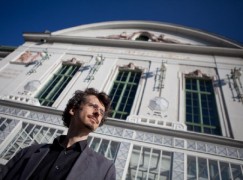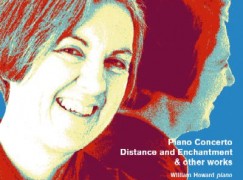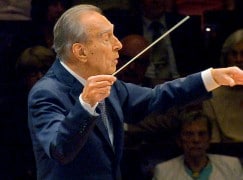The one-armed pianist is back with a solo recital disc for his 86th birthday.

The rep:
J.S. Bach: Chaconne (arranged for left hand by Johannes Brahms as Etude No. 5 for Piano) (1879)
Leon Kirchner: L.H. (1995) for Piano Left Hand
George Gershwin: The Man I Love (arranged for left hand by Earl Wild as Etude No. 3) (1954, rev. 1976)
George Perle: Musical Offerings (1997/98) (In Celebration of Leon Fleisher at 70)
Federico Mompou: Prelude No. 6 for Piano Left Hand
Dina Koston: Thoughts of Evelyn (2000) for Piano
Jerome Kern: All the Things You Are (arranged for Piano Left Hand by Stephen Prutsman)
BRIDGE 9429 | UPC: 090404942921
The reassessment continues, this chapter consisting of a closely-observed memoir by Joseph Scheer, a distinguished chamber musician.

I was 20 years old and, after 3 years of study at the New England Conservatory, for various rather unpleasant reasons, I found myself at my uncle’s house in Phoenix Arizona . I auditioned for a position at the Phoenix Symphony which was for 1 season as part time associate concertmaster. I would end up sitting 3rd chair for about half of the 33 week season. The other half I was at the back of the firsts, outside 8th stand. Eduardo Mata was the Music Director and Max Wexler was the concertmaster. This was in 1975.
I was understandably very excited to see that Stern was coming to play the Beethoven. At the first rehearsal, the concertmaster set up so that the first stand was where the first stand of 2nds usually are, leaving me to face the soloist in the 3rd chair. When I queried Max about this prior to the rehearsal he said. “Stern is a jerk, I want nothing to do with him” and “I’m sitting over there to keep out of his way.”
It was coincidental, but I had played concertmaster on the Beethoven for 2 violinists at NEC for their graduate recitals during the previous spring and so felt very well prepared to deal with the piece, and was looking forward to seeing Stern close up, performing it. I could hear Stern in the artist room warming up and it did not sound very good. It sounded like he had not practiced and he was “cramming”. I went onstage to discover the setup and sat down to warm up myself. When rehearsal started and Stern entered the hall he walked over and shook hands with Mata, then turned to me and glared at me in a most unpleasant way.
I looked at that age like I was around 16 and was a slightly cocky kid and I remember being quite perplexed by this. Why on earth is the great Stern glaring at me? Nonetheless, I continued to look directly back at him, right into his eyes. Mata began the concerto and I began to play, all the while looking right at Stern and he glaring at me. As I had performed the piece many times in the recent past I had no difficulty in playing the entire tutti from memory, while Stern kind of huffed and puffed in front of me all the while staring and glaring right into my eyes.
I was able to see the conductor peripherally with ease and so I just looked right back. I certainly had experience in dealing with big personality violinists, having played in masterclasses for Tibor Varga, Joseph Silverstein and Henryk Szeryng, but this just felt all wrong, I was a young, bright eyed and bushy tailed fan, having a particular fondness for his Barber recording among others.
As Stern entered with the solo line he continued to face me directly and played very aggressively all the while glaring at me as if I had done something awful. I knew I hadn’t and was actually getting really pissed off by this time. “Who treats people like this, that they don’t even know?” was going through that part on the brain not directly involved with playing the tutti. So I just kept staring into his raging eyes and began to wonder just how this was going to end and becoming convinced that this must be some kind of twisted test. “Should I stop staring back?” “Is this a test?” “What have I done to deserve this?”

Time passed, understandably, very slowly. I kept looking into him and as he came to the passage of 16ths about a minute in, he began to have a little trouble moving his fingers with the bow. He turned immediately a beet red and a bead of sweat began to trickle down his cheek. Nonetheless he continued to glare into me. Within a few more bars the breakdown was nearly complete and I saw not the glaring rage of moments ago, but a glimmer of terror, as he faltered, like a great live Humpty Dumpty on the edge of precipice. Then, seeing a look of absolute terror in his eyes, I smiled. Not a full smile but more of what those who know me well call the Joe Scheer smirk.
At this point he broke eye contact and did something really remarkable. He turned away very quickly, and with his 4th finger, yanked violently on his E string and immediately demanded an “A” from the oboe saying “Give me an A, my violin is out of tune”, all the while scrapping viciously on the open strings as if to illustrate the point.
He did not look at me again at any time for the rest of the run. Several violinists in the orchestra had been watching this with concern and amusement, one in particular asking at the break, “What the fuck just happened?” I was already well aware of the reputation of Stern as a powerful force in the violin world and after that I avoided him. I figured I would just have to make my way without his help, since I was certain that after this brief yet powerfully unpleasant encounter that he would always remember me.
(c) Joseph Scheer/www.slippedisc.com
Such a relief to report that an award has been made for future promise rather than long-distant achievement.
Richer today by 20,000 Euros is the Austrian composer Bernd Richard Deutsch.
(When they have three names, you’ve generally never heard of them).
He’s 37, lives in Vienna and was recently signed by Boosey & Hawkes.

Ms Fleming is attempting straight theatre, as an opera star who is coming to terms with advancing age.
In Williamstown, Massachusetts. At the aptly named WTF.

The death of Lorin Maazel deprives us of a maestro who held the podium for more than 70 years. Earlier this year, we lost Claudio Abbado and Rafael Frühbeck de Burgos.
The conductor Paul Mauffray wondered quite naturally whether this left room at the top.
So he drew up a little list. What it shows is that there are plenty of well-known conductors still active in their 80s ad 70s. It’s when you get to the 60s that the field thins out.
Here’s Paul’s list for www.slippedisc.com. Who has he forgotten?

Longest serving conductors
Anton Coppola 1917
Stanisław Skrowaczewski 1923
Sir Neville Marriner 1924
Georges Prêtre 1924
Pierre Boulez 1925
Herbert Blomstedt 1927
Michael Gielen 1927
Raymond Leppard 1927
Kurt Masur 1927
Christoph von Dohnányi 1929
Bernard Haitink 1929
Nikolaus Harnoncourt 1929
André Previn 1929
Richard Bonynge 1930
Günther Herbig 1931
Gennady Rozhdestvensky 1931
Nello Santi 1931
Vladimir Fedoseyev 1932
Libor Pešek 1933
Michel Plasson 1933
Helmuth Rilling 1933
Frans Brüggen 1934
Philippe Entremont 1934
Roger Norrington 1934
Leopold Hager 1935
Jorge Mester 1935
Seiji Ozawa 1935
Charles Dutoit 1936
Eliahu Inbal 1936
Zdeněk Mácal 1936
Zubin Mehta 1936
David Zinman 1936
Vladimir Ashkenazy 1937
Neeme Jarvi 1937
Maxim Shostakovich 1938
Yuri Temirkanov 1938
Steuart Bedford 1939
Marek Janowski 1939
Peter Schneider 1939
Walter Weller 1939
Jesús López-Cobos 1940
Christoph Eschenbach 1940
Dmitrij Kitajenko 1940
Lawrence Foster 1941
Christopher Hogwood 1941
Riccardo Muti 1941
John Nelson 1941
Yuri Simonov 1941
Edo de Waart 1941
Daniel Barenboim 1942
Thomas Sanderling 1942
Christopher Seaman 1942
Lothar Zagrosek 1942
Bruno Campanella 1943
John Eliot Gardiner 1943
Hartmut Haenchen 1943
Mariss Jansons 1943
James Levine 1943
Jeffrey Tate 1943
David Atherton 1944
Sir Andrew Davis 1944
Dennis Russell Davies 1944
Peter Eötvös 1944
Ton Koopman 1944
Leif Segerstam 1944
Leonard Slatkin 1944
Michael Tilson Thomas 1944
Antoni Wit 1944
Gianluigi Gelmetti 1945
Michail Jurowski 1945
Gustav Kuhn 1945
John Mauceri 1945
Pinchas Steinberg 1945
Jiří Bělohlávek 1946
Trevor Pinnock 1946
Christof Prick 1946
Mark Elder 1947
Philippe Herreweghe 1947
Gerard Schwarz 1947
Yan Pascal Tortelier 1947
Sylvain Cambreling 1948
Stewart Robertson 1948
Mario Venzago 1948
Ádám Fischer 1949
Hans Graf 1949
James Judd 1949
Stefan Soltesz 1949
Bruno Weil 1949
James Conlon 1950

Daniil Trifonov is champion of the new generation, Evgeny Kissin of the middle generation.
The photo, last night at Verbier with Martha Argerich and Mischa Maisky, feels like a transitional moment.
Press release, just landed:

The BBC Singers today announced the appointment of Judith Weir CBE as their new Associate Composer from January 2015, in a tenure running until 2018.
It follows the announcement that Judith Weir will be Peter Maxwell Davies’s successor as Master of the Queen’s Music, the first ever female composer to take up the role.
Weir will be the fourth composer to take up the position with the BBC Singers, following in the footsteps of Gabriel Jackson, who held the post from 2010 to 2013, Judith Bingham, and Edward Cowie who was the first BBC Singers Associate Composer in 2002.
Etienne Abelin, a member of the Lucerne Festival Orchestra, has sent us this moving reminiscence:

Half a year ago, Claudio Abbado passed away. He was a mentor for me and countless others. There’s not a day that I don’t think of him and I keep being inspired by his deeply human music making, always. His son Misha, an extraordinary young jazz bass player and composer just posted this moving piece of his, written for Claudio, here in a string sextet performance by Misha’s mother, Victoria Mullova and Orchestra Mozart Bologna friends, on January 22 2014, two days after Claudio’s death. I’m happy to share it with Misha’s permission.
We have been alerted belatedly to the statement below, dated July 16.

Joint Statement on Current Events in Israel/Palestine: We are deeply saddened and concerned by the news reaching us from Israel/Palestine and share the worries of our members. During these trying times, we must stress the importance of the art of listening. Listening skills are learnt and perfected by playing in the orchestra. We must remember how important it is to apply what we learn on stage to other aspects of our lives as well. To quote Schopenhauer, “Nothing will bring us back to the path of justice so readily as the mental picture of the trouble, grief, and lamentation of the loser.” In this conflict, both sides are losers. The West-Eastern Divan Orchestra is a community that is built on trust, respect, empathy, and a culture of listening and understanding. These values are the core of our work together. That is why the Divan is a beacon of hope for all. – Daniel Barenboim & Mariam C. Said
At midnight, Buckingham Palace did as expected. It announced Judith Weir as Master of the Queen’s Musick, the first woman to hold a largely honorific role.
Her name had been linked to the post a month ago and we heard rumours in recent weeks that she was wobbling. But the national interest prevailed and Judith will now be called upon to supply tunes for great occasions.
She gave her inaugural interview to the Guardian, a newspaper of republican tendencies, which flagged her up as ‘radical’.
Not much evidence of that in her music. No revolutions expected in the years to come.
Congratulations, Master Judith!

Stunned by his death in a road accident, colleagues and friends of the LSO’s former principal trumpet, Rod Franks, have been sharing their sorrows and memories.
Clive Gillinson, the orchestra’s former cellist and managing director (now president of Carnegie Hall), writes to www.slippedisc.com:
I knew Rod Franks very well in all my time at the LSO, and listening to his beautiful ,effortless and incredibly musical trumpet playing was one of the highlights of the life of everybody in the orchestra, as well as our audiences. He was also a very special person who contributed in so many ways in addition to his playing: he had a passion for education and was a really great teacher and communicator and he was a tremendous force for good in the orchestra, sharing his great values in so many ways that mattered. It’s impossible to imagine him being snatched away like this and tragic on a human as well as musical level.
Daniel Harding, the LSO’s principal guest conductor, writes:
I can barely comprehend that he is gone. Great sadness and a great man.
LSO violinist Maxine Kwok-Adams, who took the picture below, wrote: You always had time for a smile and a joke. We will miss your consummate musicianship and your friendship.
The BBC played tribute to Rod on Radio 3’s In Tune – an unusual, well-deserved accolade for an orchestral player.

The conductor Ilan Volkov, music director of the Iceland Symphony Orchestra, will lead an ad hoc ensemble of musicians at an anti-war protest tomorrow in Tel Aviv’s Rabin Square.
The protest, organised by the artist Omer Krieger, will call for peace talks and an end to the occupation.
A number of cultural personalities have pledged their participation. The group will gather in the square at 8pm. Their slogan reads: ‘We stand together against the silence of the sane majority and call on other to join us with the appeal, “Enough with war. Long live peace”‘.
Ilan Volkov tells www.slippedisc.com: ‘We will do some improvised vocal and instrumental response to the situation. It is a small part of an evening with many other performances.’

photo: Chris Christodoulou/Lebrecht Music&Arts












